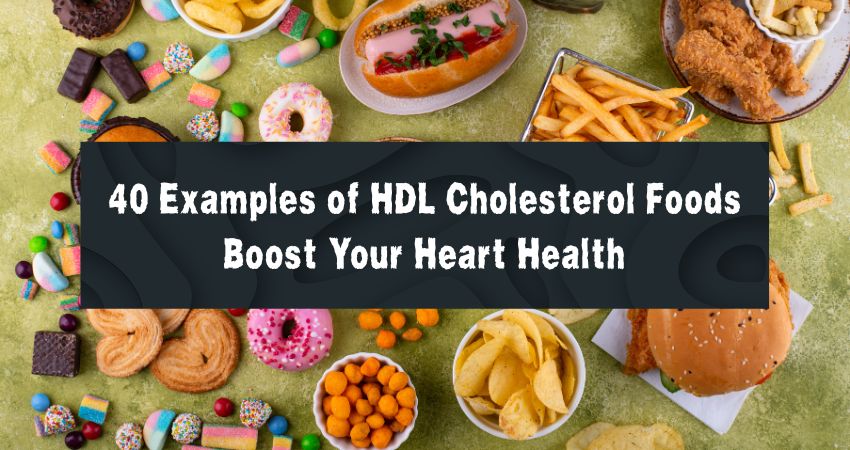HDL cholesterol, also known as “good cholesterol,” helps reduce the risk of heart disease by removing other forms of cholesterol from the bloodstream. Genetics play a role in determining cholesterol levels, but dietary choices can significantly impact HDL levels. Check out our blog for 40 examples of HDL cholesterol foods to promote heart health.
Definition of HDL Cholesterol Foods
HDL cholesterol foods are those that are known to increase the levels of High-Density Lipoprotein (HDL) cholesterol in the body. These foods are typically rich in healthy fats, fiber, and other nutrients that help to improve cardiovascular health. Some examples of HDL cholesterol foods include fatty fish like salmon and tuna, avocados, nuts and seeds, olive oil, whole grains, and legumes. By incorporating these foods into your diet, you can help to increase your HDL cholesterol levels and reduce your risk of heart disease.
Also Read it: Examples of Mediterranean diet plan
Characteristics of HDL Cholesterol Foods
Foods that boost HDL cholesterol levels typically share certain characteristics. They are often rich in heart-healthy fats, antioxidants, and fiber. Including these foods in your diet not only helps increase HDL levels but also contributes to an overall nutritious and well-balanced eating plan.
Examples of HDL Cholesterol Foods
- Olive Oil:
- Rich in monounsaturated fats, olive oil is known to increase HDL cholesterol levels.
- Fatty Fish (Salmon, Mackerel, Trout):
- Packed with omega-3 fatty acids, these fish varieties are excellent for heart health.
- Nuts (Almonds, Walnuts):
- High in monounsaturated fats and omega-3 fatty acids, nuts can boost HDL levels.
- Avocado:
- Contains monounsaturated fats and potassium, promoting heart health.
- Flaxseeds:
- Rich in omega-3 fatty acids and fiber, flaxseeds contribute to healthy cholesterol levels.
- Dark Chocolate:
- Moderate consumption of dark chocolate with high cocoa content may have heart benefits.
- Legumes (Beans, Lentils):
- Packed with fiber and plant-based proteins, legumes support heart health.
- Whole Grains (Oats, Barley):
- High in soluble fiber, whole grains can help lower LDL cholesterol.
- Berries (Blueberries, Strawberries):
- Rich in antioxidants, berries contribute to overall heart health.
- Garlic:
- Contains allicin, which may have heart-protective properties.
- Green Tea:
- Polyphenols in green tea are linked to improved cholesterol levels.
- Turmeric:
- Curcumin, the active compound in turmeric, has anti-inflammatory properties.
- Citrus Fruits (Oranges, Grapefruits):
- High in soluble fiber and vitamin C, citrus fruits support heart health.
- Soy Products (Tofu, Edamame):
- Plant-based proteins in soy can positively impact cholesterol levels.
- Eggplant:
- Contains nasunin, an antioxidant with potential heart benefits.
- Spinach:
- Rich in lutein and other antioxidants, spinach is good for heart health.
- Tomatoes:
- High in lycopene, tomatoes may contribute to cardiovascular health.
- Chia Seeds:
- Packed with omega-3 fatty acids, fiber, and protein.
- Broccoli:
- Contains plant compounds with potential heart-protective effects.
- Quinoa:
- A complete protein source with fiber and various nutrients.
- Brussels Sprouts:
- High in fiber, antioxidants, and vitamins.
- Asparagus:
- Contains folate and antioxidants, supporting heart health.
- Pomegranate:
- Rich in antioxidants, pomegranate may have cardiovascular benefits.
- Cinnamon:
- May have heart-protective properties and can be a flavorful addition to foods.
- Sunflower Seeds:
- High in monounsaturated and polyunsaturated fats.
- Cranberries:
- Contains antioxidants and may have heart benefits.
- Salmon:
- A fatty fish rich in omega-3 fatty acids.
- Algal Oil:
- A plant-based source of omega-3 fatty acids.
- Kale:
- High in fiber, vitamins, and antioxidants.
- Sweet Potatoes:
- Rich in fiber, vitamins, and antioxidants.
- Cabbage:
- Contains antioxidants and may have heart-protective effects.
- Mushrooms:
- Certain types of mushrooms may have cardiovascular benefits.
- Ginger:
- Anti-inflammatory properties and potential heart benefits.
- Artichokes:
- High in fiber and antioxidants.
- Kiwi:
- Rich in vitamins and antioxidants.
- Hazelnuts:
- High in monounsaturated fats.
- Papaya:
- Contains vitamins and enzymes that may support heart health.
- Watermelon:
- Contains lycopene and other heart-healthy compounds.
- Sesame Seeds:
- High in monounsaturated fats and various nutrients.
- Cauliflower:
- A versatile vegetable with potential heart benefits.
Incorporating HDL Cholesterol Foods into Diet
Now that you have a comprehensive list of HDL cholesterol foods, here are some practical tips for incorporating them into your diet:
- Cook with Olive Oil: Use olive oil for cooking and as a dressing for salads.
- Snack on Nuts: Enjoy a handful of nuts as a snack between meals.
- Add Flaxseeds to Smoothies: Incorporate ground flaxseeds into your morning smoothies.
- Choose Whole Grains: Opt for whole grain options like oats and barley for your meals.
- Make Fish a Regular Part of Your Diet: Include fatty fish in your weekly meal plan.
Benefits of Maintaining Healthy HDL Levels
Maintaining optimal HDL levels offers various benefits, including:
- Reduced Risk of Heart Disease: High levels of HDL cholesterol are associated with a lower risk of heart disease.
- Improved Blood Vessel Function: HDL helps improve blood vessel function and reduce inflammation.
- Protection Against Artery Damage: HDL cholesterol may protect against damage to the arteries.
Incorporating HDL cholesterol foods into your diet is a delicious and practical way to support your heart health. From flavorful spices like turmeric to nutrient-packed fruits and vegetables, these foods offer a diverse range of options to suit various tastes and preferences. Remember, maintaining a well-balanced diet, along with regular physical activity, is key to promoting overall cardiovascular health.
Make conscious choices today, and let these 40 examples of HDL cholesterol foods become a delicious and heart-healthy part of your lifestyle.

